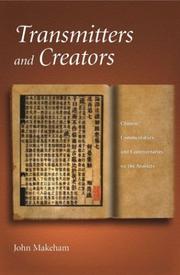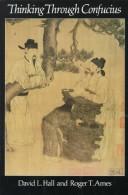| Listing 1 - 10 of 15 | << page >> |
Sort by
|
Book
ISBN: 1009029681 1009034464 1316516326 100903426X Year: 2021 Publisher: Cambridge : Cambridge University Press,
Abstract | Keywords | Export | Availability | Bookmark
 Loading...
Loading...Choose an application
- Reference Manager
- EndNote
- RefWorks (Direct export to RefWorks)
The Aura of Confucius is a ground-breaking study that reconstructs the remarkable history of Kongzhai, a shrine founded on the belief that Confucius' descendants buried the sage's robe and cap a millennium after his death and far from his home in Qufu, Shandong. Improbably located on the outskirts of modern Shanghai, Kongzhai featured architecture, visual images, and physical artifacts that created a 'Little Queli,' a surrogate for the temple, cemetery, and Kong descendants' mansion in Qufu. Centered on the Tomb of the Robe and Cap, with a Sage Hall noteworthy for displaying sculptural icons and not just inscribed tablets, Kongzhai attracted scholarly pilgrims who came to experience Confucius's beneficent aura. Although Kongzhai gained recognition from the Kangxi emperor, its fortunes declined with modernization, and it was finally destroyed during the Cultural Revolution. Unlike other sites, Kongzhai has not been rebuilt and its history is officially forgotten, despite the Confucian revival in contemporary China.
Book
ISBN: 3737006059 3847006053 3847106058 9783847106050 9863501646 9789863501640 Year: 2016 Publisher: V&R unipress GmbH
Abstract | Keywords | Export | Availability | Bookmark
 Loading...
Loading...Choose an application
- Reference Manager
- EndNote
- RefWorks (Direct export to RefWorks)
The essays collected in this volume establish Confucian role ethics as a term of art in the contemporary ethical discourse. The holistic philosophy presented here is grounded in the primacy of relationality and a narrative understanding of person, and is a challenge to a foundational liberal individualism that has defined persons as discrete, autonomous, rational, free, and often self-interested agents. Confucian role ethics begins from a relationally constituted conception of person, takes family roles and relations as the entry point for developing moral competence, invokes moral imagination and the growth in relations that it can inspire as the substance of human morality, and entails a human-centered, atheistic religiousness that stands in sharp contrast to the Abrahamic religions.
Confucianism. --- Confucian ethics. --- Religious ethics --- Religions --- Confucius. --- Konfuzius --- Kung tzu --- Kong zi --- Kongzi --- Philosophy --- Analects --- Confucianism --- Confucius --- Ethics --- Human --- Role ethics --- Philosophy, Chinese.
Book
ISBN: 2760619575 9791036504389 2760624188 9782760619579 2760629600 Year: 2004 Publisher: Montréal: Presses de l'Université de Montréal,
Abstract | Keywords | Export | Availability | Bookmark
 Loading...
Loading...Choose an application
- Reference Manager
- EndNote
- RefWorks (Direct export to RefWorks)
On ne connaît aucun écrit de Confucius, ses aphorismes ayant été recueillis sous la forme d’« Entretiens » par ses disciples. Néanmoins, depuis deux millénaires et demi les enseignements du philosophe ont non seulement imprégné la civilisation chinoise et les cultures d’Extrême-Orient, mais ont aussi inspiré philosophes et penseurs en Occident. Cet ouvrage de Herbert Fingarette, dont l’impact à sa publication en 1972 a été immédiat et majeur dans le monde anglophone, était attendu de longue date par le public francophone. Il permet d’accéder à l’enseignement de Confucius de façon simple et directe, puisque les idées du célèbre philosophe y sont essentiellement abordées par le biais de ses paroles rapportées par ses disciples, les dépouillant de toute interprétation anachronique ou encombrante. Selon Fingarette, Confucius préserve le caractère sacré du rite, mais enraciné dans la sacralité de l’existence humaine elle-même, et en le dégageant de sa gangue religieuse. La présentation et les commentaires de Charles Le Blanc viennent enrichir le texte en situant Herbert Fingarette dans le contexte général des études confucéennes et orientales, soulignant ainsi son actualité et sa profonde originalité.
Confucianisme --- Confucianism --- Confucian rites and ceremonies --- Rituel. --- Rituals. --- Customs and practices --- Confucius. --- Confucius --- Konfuzius --- Kung tzu --- Kong zi --- Kongzi --- Morale. --- Ethics. --- Criticism and interpretation --- History. --- pensée chinoise --- rituel --- sacré --- confucianisme --- philosophie chinoise --- Prisoners --- HISTORY / General. --- Civil rights
Book
ISBN: 9020245406 Year: 1995 Publisher: Deventer Ankh-Hermes
Abstract | Keywords | Export | Availability | Bookmark
 Loading...
Loading...Choose an application
- Reference Manager
- EndNote
- RefWorks (Direct export to RefWorks)
Confucius. --- Si shu. --- Konfuzius --- Kung tzu --- Kong zi --- Kongzi --- Ssu shu --- Kyŏngsŏ --- Sasŏ --- Sze shoo --- Seu-chou --- Se chou --- Sse-chou --- Four Books --- Quatre livres --- 四書 --- Sishu --- Da xue --- Zhong yong
Book
Abstract | Keywords | Export | Availability | Bookmark
 Loading...
Loading...Choose an application
- Reference Manager
- EndNote
- RefWorks (Direct export to RefWorks)
S12/0400 --- S12/0100 --- China: Philosophy and Classics--Kongzi 孔子 Confucius and Confucianism --- China: Philosophy and Classics--Bibliographies, dictionaries, yearbooks and collections --- Confucianism --- Religions --- Dictionaries&delete& --- Chinese --- Confucius --- Konfuzius --- Kung tzu --- Kong zi --- Kongzi --- Dictionaries --- Chinese.
Book
ISBN: 9780385510691 0385510691 Year: 2010 Publisher: New York Doubleday
Abstract | Keywords | Export | Availability | Bookmark
 Loading...
Loading...Choose an application
- Reference Manager
- EndNote
- RefWorks (Direct export to RefWorks)
The profound influence of Confucius across the ages--his teachings of personal and government morality, justice, and appropriateness in social relationships--is the subject of this unique history.
Confucianism. --- Konfuzianismus. --- Rezeption. --- Rezeptionsforschung. --- Confucius. --- Biographieforschung. --- Kong, Qiu, --- Kong, Qiu. --- Kong. --- China. --- Confucianism --- 299.512 --- 299.512 Confucianisme. Mencius. I Ching --- Confucianisme. Mencius. I Ching --- Religions --- Konfuzius --- Kung tzu --- Kong zi --- Kongzi
Book
ISBN: 0231539614 9780231539616 9780231169325 0231169329 Year: 2016 Publisher: New York : Columbia University Press,
Abstract | Keywords | Export | Availability | Bookmark
 Loading...
Loading...Choose an application
- Reference Manager
- EndNote
- RefWorks (Direct export to RefWorks)
The Spring and Autumn (Chunqiu) is a chronicle kept by the dukes of the state of Lu from 722 to 481 B.C.E. Luxuriant Gems of the "Spring and Autumn" (Chunqiu fanlu) follows the interpretations of the Gongyang Commentary, whose transmitters sought to explicate the special language of the Spring and Autumn. The work is often ascribed to the Han scholar and court official Dong Zhongshu, but, as this study reveals, the text is in fact a compendium of writings by a variety of authors spanning several generations. It depicts a utopian vision of a flourishing humanity that they believed to be Confucius's legacy to the world.The Gongyang masters thought that Confucius had written the Spring and Autumn, employing subtle phrasing to indicate approval or disapproval of important events and personages. Luxuriant Gems therefore augments Confucian ethical and philosophical teachings with chapters on cosmology, statecraft, and other topics drawn from contemporary non-Confucian traditions. A major resource, this book features the first complete English-language translation of Luxuriant Gems, divided into eight thematic sections with introductions that address dating, authorship, authenticity, and the relationship between the Spring and Autumn and the Gongyang approach. Critically illuminating early Chinese philosophy, religion, literature, and politics, this book conveys the brilliance of intellectual life in the Han dynasty during the formative decades of the Chinese imperial state.
Philosophy, Chinese. --- Philosophers. --- Scholars --- Chinese philosophy --- Confucius. --- Dong, Zhongshu, --- Dongzhongshu, --- Tō, Chūjo, --- Tong, Chung-sŏ, --- Tong, Tchong-chou, --- Tung, Chung-shu, --- 董仲舒, --- Konfuzius --- Kung tzu --- Kong zi --- Kongzi --- China --- Politics and government.
Book
ISBN: 0295745924 0295745940 9780295745947 9780295745923 Year: 2019 Publisher: Seattle : University of Washington Press,
Abstract | Keywords | Export | Availability | Bookmark
 Loading...
Loading...Choose an application
- Reference Manager
- EndNote
- RefWorks (Direct export to RefWorks)
"The city of Qufu in north China's Shandong Province is famous as the hometown of Kong Qiu (551-479 BCE)--known in English as Confucius, and in Chinese as Kongzi or Kong Fuzi---and the site of his tomb and temple. Serving the Sage traces the history of the direct descendants of Confucius from the inception of the hereditary title Dukes for Fulfilling the Sage in 1055 through its dissolution in 1935, after the fall of China's dynastic system in 1911. The Kongs' administrative record, the largest such family archive in China, documents the history of northern Chinese agriculture, market formation, rural violence, and rent resistance. Serving the Sage draws on this rich material to address key themes in Chinese social history, such as agricultural commercialization, the structure and function of periodic marketing systems, and the impact of rural violence on political destabilization and social upheavals. The picture that emerges is that of a kinship group descended from Confucius and ruled by a hereditary duke that mobilized substantial and often coercive forces to manage agricultural labor, dominate rural markets, and profit from commercial enterprises. The book also examines how genealogies and ritual texts, through their performance and circulation, reproduced a model of kinship organization that reinforced ducal power. Elites shaped cultural practice and collective memory, while competing with state and popular interests. Confucian ritual was at once a means to reproduce existing social hierarchies and a potential site of conflict and subversion"--
Qufu Shi (China) --- History. --- Politics and government. --- Social conditions. --- Chʻü-fu shih (China) --- 曲阜市 (China) --- Qufu Xian (China) --- Nobility --- Kinship --- Confucius --- Family. --- Ethnology --- Clans --- Consanguinity --- Families --- Kin recognition --- Noble class --- Noble families --- Nobles (Social class) --- Peerage --- Upper class --- Aristocracy (Social class) --- Titles of honor and nobility --- Konfuzius --- Kung tzu --- Kong zi --- Kongzi

ISBN: 067401216X 1684173906 9780674012165 9781684173907 Year: 2003 Volume: 228 Publisher: Boston Leiden;Boston Harvard University Asia Center BRILL
Abstract | Keywords | Export | Availability | Bookmark
 Loading...
Loading...Choose an application
- Reference Manager
- EndNote
- RefWorks (Direct export to RefWorks)
Confucius. --- S12/0363 --- China: Philosophy and Classics--Lunyu 論語 Analects --- Konfuzius --- K'oeng Foe-tse --- Kung-foo-tsze --- Kung-Kew --- Kong-Fou-Tze --- Kʻung, Chʻiu --- Kwan-Foo-Tze --- Kung-tse --- Konfut︠s︡ius --- Konfut︠s︡iĭ --- Kʻung, Fu-tzu --- Kʻung Fu-tzu --- Kongja --- Khong Tju --- Kōshi --- Kʻung-tzu --- Kungfutse --- Confucio --- Kongzi --- Khong Čhư̄ --- Khongčhư̄ --- Kan̲pūciyas --- Kong fu zi --- 孔丘 --- 孔夫子 --- 孔子 --- 공자 --- Kung tzu --- Confucius --- Confucius. - Lun yu. --- Philosophy, Chinese

ISBN: 0887063764 0887063772 Year: 1987 Publisher: Albany State university of New York press
Abstract | Keywords | Export | Availability | Bookmark
 Loading...
Loading...Choose an application
- Reference Manager
- EndNote
- RefWorks (Direct export to RefWorks)
Confucius. --- Konfuzius --- K'oeng Foe-tse --- Kung-foo-tsze --- Kung-Kew --- Kong-Fou-Tze --- Kʻung, Chʻiu --- Kwan-Foo-Tze --- Kung-tse --- Konfut︠s︡ius --- Konfut︠s︡iĭ --- Kʻung, Fu-tzu --- Kʻung Fu-tzu --- Kongja --- Khong Tju --- Kōshi --- Kʻung-tzu --- Kungfutse --- Confucio --- Kongzi --- Khong Čhư̄ --- Khongčhư̄ --- Kan̲pūciyas --- Kong fu zi --- 孔丘 --- 孔夫子 --- 孔子 --- 공자 --- Philosophy --- Philosophy & Religion --- Kung tzu --- Kong zi
| Listing 1 - 10 of 15 | << page >> |
Sort by
|

 Search
Search Feedback
Feedback About UniCat
About UniCat  Help
Help News
News